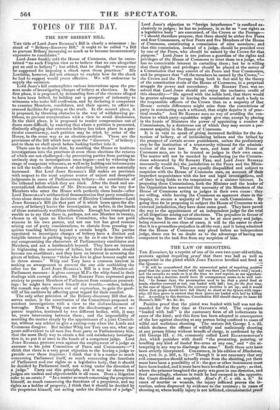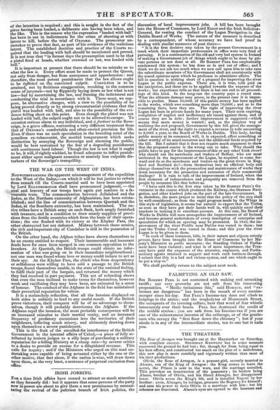THE LAW OF SHOOTING.
THE Examiner, by a reprint of one of its own two-year-old articles, protests against requiring proof that there was ball as well as gunpowder in the pistol which JOHN FRANCIS levelled and fired at the Queen- " It will be remembered that the nonsensical point of requiring positive proof that the pistol was loaded with ball was then [at Oxford's trial] raised; and the remarks we made on it at the time we now reprint, as our apprehen- sion that such a doctrine would have ill consequences seems to be well veri- fied. ' In former days, the presumption used to be, that a pistol fired at heads, whether crowned or not, was loaded with ball; but, for the first time, in the case of Queen Victoria, the contrary doctrine is set up; and it would follow that people should have full liberty to shoot at the Queen with impu- nity, till they prove in earnest that their pieces are loaded with ball by killing her. According to this doctrine, Constitution Bill should change its name for Shooter's Bill.'" &c. &c. &c.
Positive proof that the pistol was loaded with ball was not de- manded for the first time at OXFORD'S trial. The expression "loaded with ball" is the customary form of all indictments in cases of the kind ; and this form has been adopted in consequence of the law against shooting at any person being confined to cases of wilful and malicious shooting. The statute 9th George I. c. 22, which declares the offence of wilfully and maliciously shooting at any person felony without benefit of clergy, is confirmed by the 43d George III. c. 58, commonly called Lord ELLENBOROUGH'S Act, which punishes with death "the presenting, pointing, or levelling any kind of loaded fire-arms at any one," and " the at- tempting in any way to discharge the same." Both these acts have been strictly interpreted. COLERIDGE, in his edition of Blackstone, says, (vol. iv. p. 207, n. 3)—" Though it is not necessary that any evil consequence should actually ensue from the shooting, yet there must have been a possibility of it : the gun or other instrument must have been loaded, and it must have been levelled at the party : so that, where the prisoner imagined the party was gone in one direction, and fired accordingly, whereas in truth he had escaped in the opposite, the Court directed an acquittal. East's P. C. c viii. a. 6." In cases of murder or wounds, the injury inflicted proves the in- tention, unless disproved by evidence to the contrary ; in cases of shooting at, where bodily injury is not inflicted, circumstantial proof
of the intention is required ; and this is sought in the fact of the piece having been loaded, a deliberate aim having been taken, and the like. This is the reason why the expression "loaded with ball" has been in use in indictments for the crime of shooting at with intent to kill, before the trial of Oxroan. The prosecutor un- dertakes to prove that fact, as part of his evidence of the malicious intent. The established doctrine and practice of the Courts re- quired that the loading with ball should be mentioned and proved. It is not true that "in former days the presumption used to be that a pistol fired at heads, whether crowned or not, was loaded with ball."
It is important at present that there should be no mistake as to what the law is. Every effort must be made to protect the Queen, not only from danger, but from annoyance and apprehension : and therefore, the most potent punishment that the law allows ought to be inflicted on the convicted culprit. Conviction is to be attained, not by fictitious exaggeration, revolting to the common sense of jurymen—not by flippantly laying down as law what is not law—but by ascertaining the law, and framing the indictment and conducting the trial in accordance with it. There must, we sup- pose, be alternative charges, with a view to the possibility of its being proved directly or by strong circumstantial evidence that the pistol was loaded with ball, and also to the possibility of the evi- dence falling short on this point. Even though the pistol was not loaded with ball, the culprit ought not to be allowed to escape. To occasion serious alarm to any individual, and a fortiori to the Sove- reign, is a grave offence, warranting a very different treatment from that of ORFORD'S comfortable and often-envied provision for life. Even if there was no such speculation in the brooding mind of the penniless ex-tobacconist, the morbid temperament which seeks distinction by annoying the Sovereign and alarming the public, would be best restrained by the fear of a degrading punishment with continuous bard labour. Though the law is not what it ought to be, it will, if rightly wielded, be found adequate to inflict punish- ment either upon malignant assassins or scarcely less culpable dis- turbers of the Sovereign's tranquillity.



























 Previous page
Previous page